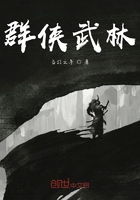"A full account shall be given," said Rudolf. "Now let all leave me, except the Count of Tarlenheim and Lieutenant von Bernenstein."
Most unwillingly, with gaping mouths and wonder-struck eyes, the throng filed out of the door. Rischenheim rose to his feet.
"You stay, if you like," said Rudolf, and the count knelt again by his kinsman.
Seeing the rough bedsteads by the wall of the attic, I touched Rischenheim on the shoulder and pointed to one of them. Together we lifted Rupert of Hentzau. The revolver was still in his hand, but Bernenstein disengaged it from his grasp. Then Rischenheim and I laid him down, disposing his body decently and spreading over it his riding cloak, still spotted with the mud gathered on his midnight expedition to the hunting-lodge. His face looked much as before the shot was fired; in death, as in life, he was the handsomest fellow in all Ruritania. I wager that many tender hearts ached and many bright eyes were dimmed for him when the news of his guilt and death went forth. There are ladies still in Strelsau who wear his trinkets in an ashamed devotion that cannot forget. Well, even I, who had every good cause to hate and scorn him, set the hair smooth on his brow; while Rischenheim was sobbing like a child, and young Bernenstein rested his head on his arm as he leant on the mantelpiece, and would not look at the dead. Rudolf alone seemed not to heed him or think of him. His eyes had lost their unnatural look of joy, and were now calm and tranquil. He took his own revolver from the mantelpiece and put it in his pocket, laying Rupert's neatly where his had been. Then he turned to me and said:
"Come, let us go to the queen and tell her that the letter is beyond reach of hurt."
Moved by some impulse, I walked to the window and put my head out. I was seen from below, and a great shout greeted me. The crowd before the doors grew every moment; the people flocking from all quarters would soon multiply it a hundred fold; for such news as had been carried from the attic by twenty wondering tongues spreads like a forest-fire. It would be through Strelsau in a few minutes, through the kingdom in an hour, through Europe in but little longer. Rupert was dead and the letter was safe, but what were we to tell that great concourse concerning their king? A queer feeling of helpless perplexity came over me and found vent in a foolish laugh. Bernenstein was by my side; he also looked out, and turned again with an eager face.
"You'll have a royal progress to your palace," said he to Rudolf Rassendyll.
Mr. Rassendyll made no answer, but, coming to me, took my arm. We went out, leaving Rischenheim by the body. I did not think of him; Bernenstein probably thought that he would keep his pledge given to the queen, for he followed us immediately and without demur. There was nobody outside the door. The house was very quiet, and the tumult from the street reached us only in a muffled roar. But when we came to the foot of the stairs we found the two women. Mother Holf stood on the threshold of the kitchen, looking amazed and terrified. Rosa was clinging to her; but as soon as Rudolf came in sight, the girl sprang forward and flung herself on her knees before him, pouring out incoherent thanks to Heaven for his safety. He bent down and spoke to her in a whisper; she looked up with a flush of pride on her face. He seemed to hesitate a moment; he glanced at his hands, but he wore no ring save that which the queen had given him long ago. Then he disengaged his chain and took his gold watch from his pocket.
Turning it over, he showed me the monogram, R. R.
"Rudolfus Rex," he whispered with a whimsical smile, and pressed the watch into the girl's hand, saying: "Keep this to remind you of me."
She laughed and sobbed as she caught it with one hand, while with the other she held his.
"You must let go," he said gently. "I have much to do."
I took her by the arm and induced her to rise. Rudolf, released, passed on to where the old woman stood. He spoke to her in a stern, distinct voice.
"I don't know," he said, "how far you are a party to the plot that was hatched in your house. For the present I am content not to know, for it is no pleasure to me to detect disloyalty or to punish an old woman. But take care! The first word you speak, the first act you do against me, the king, will bring its certain and swift punishment. If you trouble me, I won't spare you. In spite of traitors I am still king in Strelsau."
He paused, looking hard in her face. Her lip quivered and her eyes fell.
"Yes," he repeated, "I am king in Strelsau. Keep your hands out of mischief and your tongue quiet."
She made no answer. He passed on. I was following, but as I went by her the old woman clutched my arm. "In God's name, who is he?"
she whispered.
"Are you mad?" I asked, lifting my brows. "Don't you know the king when he speaks to you? And you'd best remember what he said.
He has servants who'll do his orders."
She let me go and fell back a step. Young Bernenstein smiled at her; he at least found more pleasure than anxiety in our position. Thus, then, we left them: the old woman terrified, amazed, doubtful; the girl with ruddy cheeks and shining eyes, clasping in her two hands the keepsake that the king himself had given her.
Bernenstein had more presence of mind than I. He ran forward, got in front of both of us, and flung the door open. Then, bowing very low, he stood aside to let Rudolf pass. The street was full from end to end now, and a mighty shout of welcome rose from thousands of throats. Hats and handkerchiefs were waved in mad exultation and triumphant loyalty. The tidings of the king's escape had flashed through the city, and all were there to do him honor. They had seized some gentleman's landau and taken out the horses. The carriage stood now before the doors of the house.















